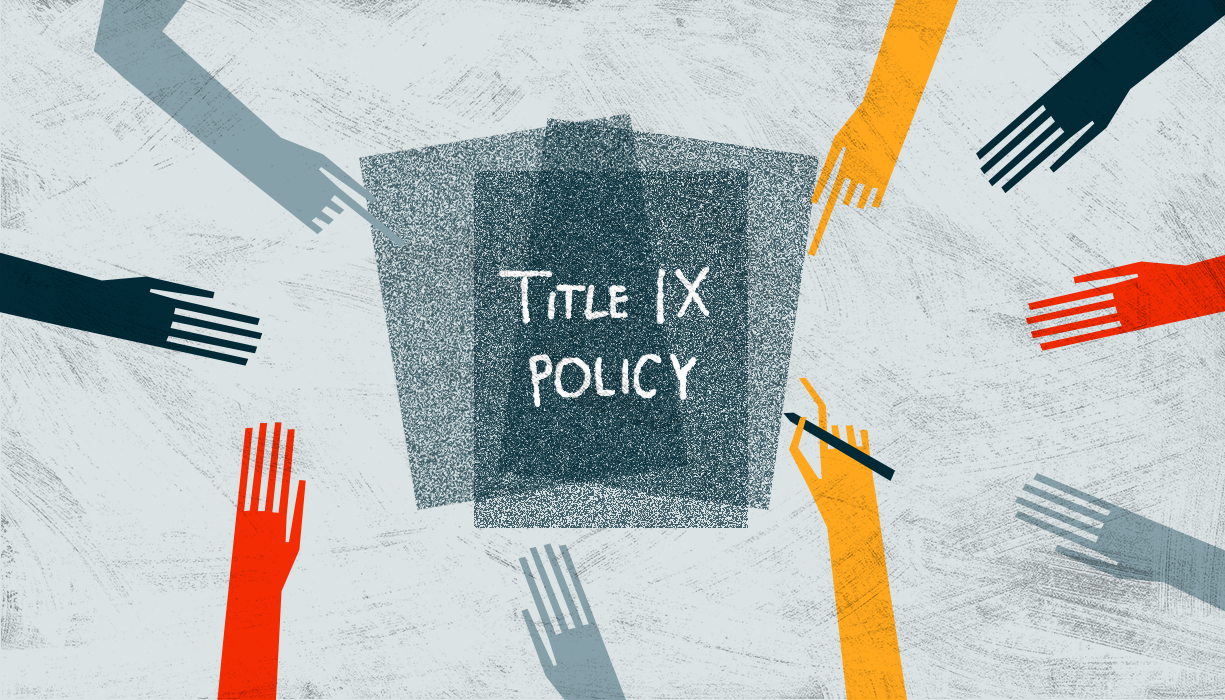The version of this article in print incorrectly stated there is no time constraint for filing Title IX complaints with the federal Office for Civil Rights. A complaint must be filed within 180 days of the incident. The New School’s online portal for reporting grievances allows incidents to be reported as far back as 2008.
The university’s sexual misconduct policies likely won’t be revised before the end of the academic year after a series of listening tours, which have so far not included undergraduate students, started later than expected, New School administrators said.
Administrators have had discussions with more than 200 faculty, staff and select graduate students in recent weeks, Amy Malsin, a university spokesperson, told The New School Free Press. Sessions open to undergraduates are scheduled for the upcoming weeks, she added.
Malsin confirmed to the Free Press that the policy will not likely be revised by May.
The Title IX review comes after multiple accusations of sexual misconduct by faculty had come to light.
Title IX is a federal law that prohibits sex discrimination in educational institutions that receive federal funding. Sexual misconduct and assault in these institutions fall under Title IX. Title IX’s legal interpretation makes it the responsibility of universities to respond appropriately to and investigate allegations of sexual misconduct against students.
One aspect of the university’s existing policy under review is the lack of a clear prohibition on relationships between faculty and undergraduates, as well as between supervisors and supervisees, according to an administrator involved in the review.
The New School’s policy review comes in the wake of backlash from student groups, including the Graduate Faculty Student Senate, over how the university handled reports of sexual misconduct by former New School for Social Research psychology chair Emanuele Castano. An undergraduate student filed a complaint of an inappropriate relationship with Castano in 2017.
Castano resigned from his position at The New School in October 2017. “In light of Professor Castano’s resignation, we consider this matter closed,” wrote Jennifer Francone, The New School’s Title IX Coordinator and assistant vice president of Student Equity and Access, in an email to the student who filed the complaint.
Joseph Colaneri, the head of the opera department at Mannes School of Music, has also been accused of sexual misconduct, as reported by the New York Post. Colaneri headed the opera department since 1997. An adjunct faculty member at Mannes accused Colaneri of harassing her in 2001. She lost her job for unrelated reasons shortly after, according to the Post report.
“[B]ased on our initial review of the facts, Mr. Colaneri had no involvement in the decision to terminate her employment. She was fired for multiple violations of university policy regarding her conduct involving students,” a university spokesperson told the New York Post.
In a statement to the Free Press, President David Van Zandt said “no single example sparked the policy review.”
The New School plans to “strengthen our Title IX policies and practices and improve access to information and resources related to Title IX complaints,” Van Zandt said in a December email to students and faculty.
“We also know that acts of misconduct have been present in our own New School community, including recent ones that compel us to shine a bright light on our response and responsibility,” Van Zandt said in the email.
Students have been critical of the university’s lack of transparency in handling these events of sexual misconduct.
“The university is always forthcoming with damage control and with presenting a good image, but its communications with students last year were vague and not explanatory,” said Srishti Yadav, an NSSR student studying economics.
In January, the university hired Rhonnie Jaus, a former New York assistant district attorney specializing in prosecuting sex crimes, as vice president for Equal Employment Opportunity, Affirmative Action, and Compliance. She will be a “leading member” of the team working on the Title IX review, according to the December Van Zandt email.
The following month, Michelle Relyea, senior vice president for Student Success, told the Free Press that the university wanted to host “a couple of town halls before spring break and then a couple after spring break” for students.
In a March 27 email to the Free Press, Relyea said the dates were still being organized, and that information would be passed along “once the days/times are solidified.” As of April 5, none of these town halls happened.
Sessions open to undergraduate students are scheduled during the coming weeks. The office of Student Success will be releasing more information on the dates and times of these tours, Malsin said.
In an interview, Jaus emphasized the importance of community input on determining this policy.
“Before we make the final revisions of the policy, we want to hear what our entire community has to say, the students, faculty and the staff,” Jaus said.
Jaus worked in the Brooklyn District Attorney’s Office for more than 25 years. She was the executive division chief of the Sex Crimes/Special Victims & Crimes Against Children Division.
The Brooklyn DA’s office faced criticism while Jaus worked there, for the under-prosecution of sex crimes in Orthodox Jewish neighborhoods.
In 2014, Kings County District Attorney John Hynes declined to confirm the number of adults arrested for child sex crimes in the Orthodox Jewish community during his time as district attorney. Hynes also declined to confirm the number of adults convicted of sex crimes, as well as release their names.
Jaus, as executive division chief of the Sex Crimes/Special Victims & Crimes Against Children Division, confirmed to the New York Post a figure of 85 adults arrested, and 14 convicted of sex crimes.
After leaving the DA’s office, Jaus worked as the Title IX Coordinator and director of Equity and Compliance at Adelphi University where she facilitated Title IX workshops for faculty and staff and created the Advanced Sexual Assault and Awareness Prevention (ASAAP).
How the New School’s sexual misconduct policies and procedures could be revised is so far unclear.
When a Title IX complaint is filed at a university, the institution opens an investigation into the claims. Universities in the United States have Title IX Coordinators, who are responsible for conducting investigations and if applicable, enforcing disciplinary actions. The New School’s Title IX Coordinator is Jennifer Francone, who also serves as assistant vice president of Student Equity and Access.
Supreme Court decisions and guidelines from the U.S. Department of Education have showed institutions how they should handle complaints of sexual misconduct. However, they are only guidelines, as schools must determine their own Title IX policy.
Under federal law, universities determine their own procedures in handling these allegations of sexual harassment and misconduct. A complementary New York law, Article 129B, goes further than the federal statute, and protects anyone who has a “reasonable connection” to a college or university, covering incidents that happen off-campus or those studying abroad.
Currently, staff and faculty at The New School are required to complete online training each year to understand Title IX. Jaus has been conducting additional training sessions with staff and faculty to augment what is required, she said.
The university has acknowledged that existing training is inadequate.
“Feedback indicates that the online training module is not sufficient for an issue so complex, personal, and important,” Van Zandt said in a university-wide email.
Yadav, the graduate student, feels that the university needs to take more action in informing the community on the issues surrounding sexual misconduct, from what behavior is appropriate, to where and how to report incidents.
“The onus should not be on the students. The university needs to be proactive,” Yadav said.
Jaus will train students, faculty and staff in the final policy once it is determined.
“There is really no replacement for in-person training. In-person training allows you to ask questions and get answers and start a dialogue,” Jaus said.
Under Title IX, employees of The New School are designated as “responsible employees under Title IX” and are obligated to report any allegations of gender-based incidents to the Title IX coordinator.
Staff and faculty are being trained in this responsibility, Jaus said. Before someone is about to disclose an incident to them, they should make it clear that they are required to report the allegation, which opens up a Title IX investigation. Jaus is working to ensure that staff and faculty understand their responsibilities as mandated reporters with her training sessions.
Jaus oversees incidents involving faculty and staff. Jennifer Francone, assistant vice president for Student Equity and Access, oversees incidents involving students.
Jaus said she hopes campus outreach will encourage people to report by helping them understand their rights and the resources they can access.
“I feel that once people understand that there’s a place for them to go, resources for them, many, many protections in the law that can help them, it will encourage people to report,” she said.
There are confidential sources on campus where people can go to disclose an incident that will not open an investigation.
Students can talk to Student Health Services or the Student Ombuds office without an investigation being opened.
Student employees have time constraints for filing work-related grievances, which SENS-UAW, The New School’s student union, is currently trying to change. However, student workers would use the same resources to report incidents of sexual misconduct, or to talk about an incident confidentially.
Complaints with the Office for Civil Rights must be filed within 180 days of the incident.
Faculty and staff can report incidents confidentially to the Ombuds office, without an investigation being opened.
People who have been subject to the offenses that fall under Title IX and Article 129B are entitled to accommodations under these laws. These accommodations can include academic adaptation, changes to work schedules to avoid an offender, changes in on-campus housing, escorts from Campus Safety, or no contact orders.
Jaus emphasized a protection within Article 129B, which grants amnesty to people reporting incidents of misconduct while using illegal drugs or alcohol.
“I truly believe that once people hear that there is amnesty, and they understand it, it may encourage more people to come forward, and people wouldn’t be so afraid,” Jaus said.
Jaus acknowledged the underreported nature of sex crimes.
“It always makes me feel sad when people say they know people who aren’t reporting,” Jaus said.
Illustration by Ashlie Juarbe. Contributed reporting by Ashlyn O’Hara.







